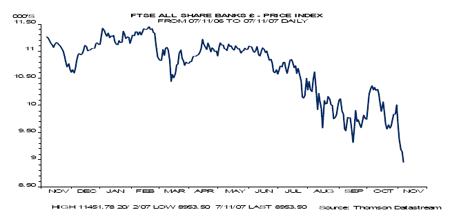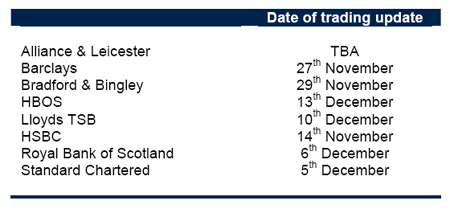Get the latest financial news, insights and expert analysis from our award-winning MoneyWeek team, to help you understand what really matters when it comes to your finances.
You are now subscribed
Your newsletter sign-up was successful
Want to add more newsletters?

Twice daily
MoneyWeek
Get the latest financial news, insights and expert analysis from our award-winning MoneyWeek team, to help you understand what really matters when it comes to your finances.

Four times a week
Look After My Bills
Sign up to our free money-saving newsletter, filled with the latest news and expert advice to help you find the best tips and deals for managing your bills. Start saving today!
Alarm bells started to ring that financial stocks were lurching back into the eye of the credit crunch storm when we noted that the ABX index had declined significantly in recent days.
The ABX Index is a series of credit-default swaps based on 20 bonds that consist of sub-prime mortgages. The decline in the ABX index signifies investor sentiment that subprime mortgage holders will suffer increased financial losses from those investments.
Until recently the part of the index that followed AAA rated debt traded at almost face value but in the past month it has fallen significantly due to a further weakening in the US housing sector.
MoneyWeek
Subscribe to MoneyWeek today and get your first six magazine issues absolutely FREE

Sign up to Money Morning
Don't miss the latest investment and personal finances news, market analysis, plus money-saving tips with our free twice-daily newsletter
Don't miss the latest investment and personal finances news, market analysis, plus money-saving tips with our free twice-daily newsletter
This deterioration has a bigger impact than one would first imagine as the index is used to value parts of conduits and structured investment vehicles (SIVs) that are rarely traded. The fact that these assets now have to be marked down' in accountancy terms is part of the reason why banks like Citigroup and Merrill Lynch have had to reassess the value of their assets and return to the confessional with further substantial write-downs.
Some investors had hoped that the US investment banks had kitchensinked' in the Q3 results and therefore a line could be drawn under the credit problem, allowing the bull market to continue. However, with Citigroup announcing a further write-down of the order of $8bn to $11bn, in addition to the $3.3bn write-down announced at the end of the third quarter, we are clearly not out of the woods yet. And of course the market is not only unsettled by the magnitude of the write-downs but also the degree of uncertainty.
Although Gary Crittenden, Citi's Chief Financial Officer has pointed out that the recent mortgage related issues have been non-cash events, this still has an impact on reported earnings and importantly on capital ratios. If write-downs are substantial enough then banks may have to cancel share-buyback programmes, limit the growth of or even cut dividends and potentially need to come to the market to raise additional capital.
With the recent departure of the Chief Executives from Citigroup and Merrill Lynch it appears that the plan to set up a $75bn Superfund to prevent fire sales of assets has stalled. And we also note that the potential for the rating agencies to downgrade Ambac or MBIA, the US bond insurers' triple A rating would have a significant knock on effect, specifically in the $2,500bn US municipal bond market as it would cause forced sales of assets.
The UK Banking Sector
So where does that leave the UK banking sector? The sector has suffered a significant de-rating this year. We have had the implosion of Northern Rock (NRK), which was a funding issue. But as far as the bad debt/write-down issue there has been little news flow. We take a brief look at each segment of the sector and bank and review the situation:

UK Mortgage Banks
Mortgage banks have been hit by concerns about funding (especially Northern Rock) and concerns regarding mortgage volume growth going forward due to the hikes in interest rates. The outlook is negative with the majority of borrowers on fixed rate deals which are still to be hit by an "interest rate shock". This will typically lead to mortgage payments increasing by over 25% as their fixed rate term comes to an end in 2008. Going forward this will hit mortgage volumes and also the amount of mortgage arrears.
Mortgage banks are usually seen as lower risk (without the investment banking exposure) and have traditionally benefited from a flight to safety' in more volatile markets conditions. However, this has not been the case during the current credit crisis.
We have been negative on mortgage banks for the last two years. Year to date and since the market turbulence started around July 16, Alliance & Leicester (AL) (Hold), Bradford & Bingley (BB) (Reduce) and obviously Northern Rock (Hold) have been the worst performers in the sector.
However, we do accept that although earnings growth is likely to be anaemic, with A&L and B&B yielding over 7% this segment has become increasingly attractive for those looking for yield.
Retail Banks
HBOS (HBOS) and Lloyds TSB (LLOY) have been the best performing UK banks during the summer correction excluding the international banks HSBC and (HSBA) Standard Chartered (STAN). HBOS (Hold) has a large deposit base which means it is less reliant on wholesale funding. Also HBOS and Lloyds TSB have relatively small investment banking revenues.
Lloyds TSB (Accumulate) has been one of our two preferred stocks in the sector. This is almost by default as most readers will know we have been far from enamoured with the Group's rather boring UK centric business. However, in this environment boring is re-assuring and this is precisely why the stock has been the best performing UK orientated bank year to date and since the market turbulence started around July 16.
Universal Banks
Barclays (BARC) and RBS (RBS) have suffered substantially this year due to concerns regarding their investment banking divisions. Not only have their markets divisions got significant exposure to conduits and SIVs (especially Barclays Capital) but also these operations have generated strong growth in earnings in recent years, which might not be repeated going forward.
With the US investment banks reporting significant losses in recent weeks it is unlikely that Barclays and RBS have got off scott free. We requested information from Barclays regarding its exposure to SIVs and conduits on 29th August and were told that it would inform the market of anything "material in the context of the Group".
Due to the lack of hard numbers to work from the market is left to speculate on the requirement for write-downs and with sentiment so negative this has hit share prices hard. Of course for these two banks the prolonged battle for ABN Amro (AABA) through the summer has also unsettled investors. Since the market turbulence started around July 16, RBS (Hold) and Barclays (Accumulate) have been the next worst performers, after the mortgage banks, falling 34%.
International Banks
Standard Chartered has been the best performing UK listed bank during the summer correction and year to date. Standard Chartered's stratospheric rating (17.7x 2007 earnings) has been underpinned by strong earnings momentum and the fact that Asia has so far taken the credit crunch in its stride.
HSBC has been the second best performing stock during the summer correction and year to date. The market has felt that HSBC kitchen sinked' all the bad news with their profit warning in February and so the bad news is known and in the price. Our recommendation remains Hold on both stocks due to their premium ratings to the sector and also our increasing concerns regarding the impact that a slowing US and Japanese economy might have on the wider Asian markets and economies.
Conclusion
In the run up to the US investment banks Q3 results many influential commentators remarked that whatever the magnitude of the write-downs, it was key that transparency had to be improved so that investors could understand the magnitude of potential losses.
This clearly has not been achieved and with the market spooked by a further round of write-downs, expectations regarding the amount of potential sub-prime related losses have deteriorated almost daily.
The problems are compounded by the bank's originate and distribute' strategy which means that it is unclear whether the pain will hit banks, hedge funds or pension funds the hardest.
The credit crunch is also likely to mute future earnings growth with the reduction in the overall level of capital available to grow risk weighted assets, a reduction in risk tolerance and also changes will be made to the originate and distribute' strategy.
Earlier in the year we became increasingly concerned regarding banking strategies that were becoming ever more complex, exotic and aggressive and seemed to be reliant on abundant levels of global liquidity. We therefore went to a defensive stance on the sector and downgraded our recommendations on 5 out of the 9 UK banks in 2007 before the summer market turmoil started. And for those reasons highlighted above we believe it is right at the current time to remain cautious despite historically low P/E ratios.
We only have two positive recommendations on UK banks. Lloyds TSB (Accumulate) is currently our preferred bank in the sector due to its relatively low risk balance sheet. We also have an Accumulate recommendation on Barclays. Our positive stance on Barclays has been due to the fact that we felt it would lose the battle for ABN Amro and would benefit from a relief rally. The relief rally did take place but was short-lived as it was overtaken by concerns regarding Barclays Capital. Whereas we believe that concerns about Barclays Capital over recent years have been wildly overdone on this occasion we share some of the market's concerns.
However, it is very difficult to downgrade the stock because the latest news flow regarding Barclays Capital on October 12 was that July and August was profitable and that September was substantially ahead of the previous two months.
Also, given the fact that the market capitalisations of Barclays and RBS have fallen by £15.4bn and RBS by £20.8bn respectively since the volatility started, this mark down in value is markedly greater than any estimate that we have seen of potential write-downs. The trading update on 27th November will be very important for Barclays and of course for the read across to RBS and the rest of the sector.

By Jeremy Batstone-Carr, Director of Private Client Research at Charles Stanley
Get the latest financial news, insights and expert analysis from our award-winning MoneyWeek team, to help you understand what really matters when it comes to your finances.
MoneyWeek is written by a team of experienced and award-winning journalists, plus expert columnists. As well as daily digital news and features, MoneyWeek also publishes a weekly magazine, covering investing and personal finance. From share tips, pensions, gold to practical investment tips - we provide a round-up to help you make money and keep it.
-
 Should you buy an active ETF?
Should you buy an active ETF?ETFs are often mischaracterised as passive products, but they can be a convenient way to add active management to your portfolio
-
 Power up your pension before 5 April – easy ways to save before the tax year end
Power up your pension before 5 April – easy ways to save before the tax year endWith the end of the tax year looming, pension savers currently have a window to review and maximise what’s going into their retirement funds – we look at how

